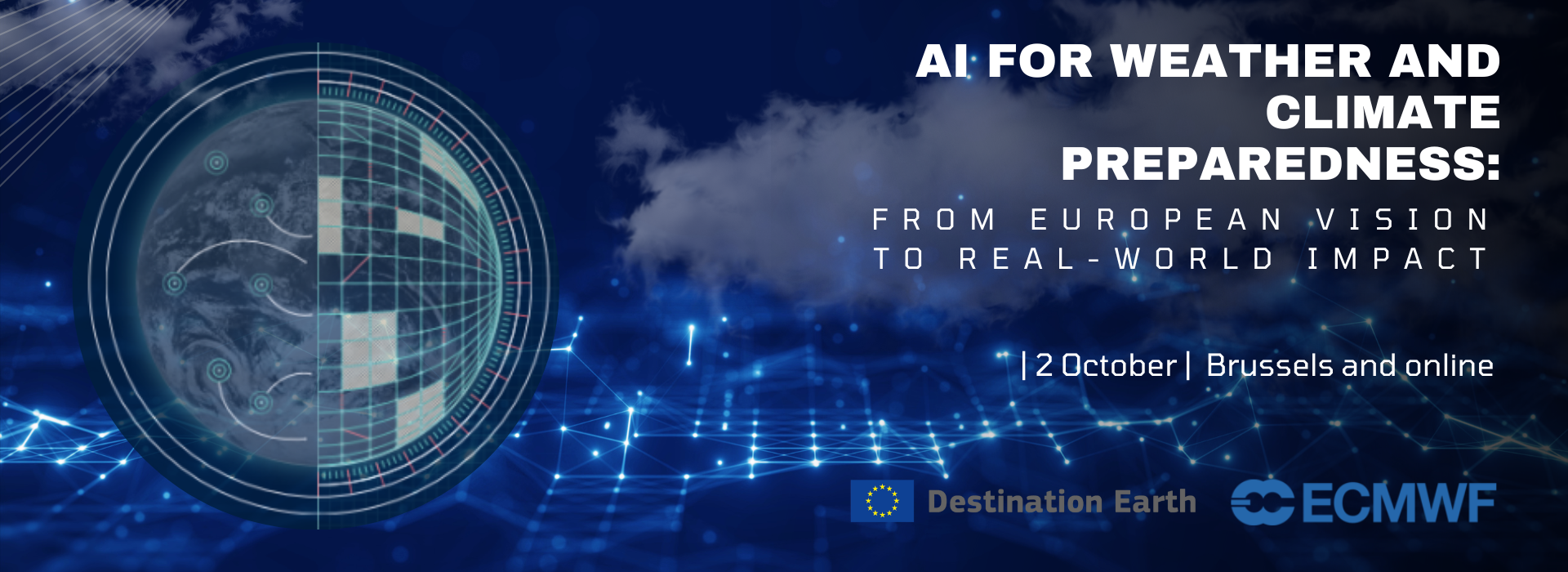
AI for weather and climate preparedness and resilience: From European vision to real-world impact
This high-level, half-day event is organised by ECMWF with the support of the European Commission’s Directorate-General for Communications Networks, Content and Technology (DG CNECT) and in partnership with Science|Business.
The event will explore how Europe’s cutting-edge AI and digital initiatives including Destination Earth (DestinE), AI Factories, EuroHPC and national programmes are strengthening Europe’s preparedness and resilience to climate change and extreme weather events, while boosting its digital sovereignty and strategic autonomy.
The event will be livestreamed and online participation is possible as well.
Event details:
Date: 2 October 2025
Time: 14:00 – 18:30 CEST
Location: Skyline, Brussels, Belgium and online
Cost: Free
Agenda
14:05 Orientation video: What is Destination Earth?
14:10 Opening remarks: Europe’s digital and AI strategy for resilience
- Grazyna Piesiewicz, Head of Unit, High Performance Computing and Applications, DG CNECT, European Commission
14:20 Building Europe’s AI Ecosystem for Real-World Impact
Panel discussion featuring:
- Anna Dimitrijevics, Deputy Head of Unit, Preparedness and Adaptation, DG CLIMA, European Commission
- Cristian Canton, Associate Director, Barcelona Supercomputing Centre
- Petteri Taalas, Director-General, Finnish Meteorological Institute
- Monique Kuglitsch, Innovation Manager, Fraunhofer HHI
Moderated by Simon Pickard, Network Director, Science|Business
15:00 Spotlight: AI in action for weather, climate & modelling
Panel discussion featuring:
- Sara Hahner, Scientist for Machine Learning, ECMWF
- Eva Prieto, Climate Change Specialist, Predictia
- Lene Østvand, Researcher, MET Norway
Chaired by Marianne Thyrring, Director-General, Danish Meteorological Institute
15:30 Coffee Break
16:00 From ideas to implementation: maturing Europe’s AI capability
Panel discussion featuring:
- Erwan Marteil, Head of Unit, Prevention and Preparedness Capacity Building, DG ECHO, European Commission
- Irina Sandu, Director, Destination Earth, ECMWF
- Maarten Van Aalst, Director-General, Royal Netherlands Meteorological Institute
- Ana Oliveira, Chief Technology Officer, +Atlantic
Moderated by Simon Pickard, Network Director, Science|Business
16:45 Closing reflections: coordinating for European leadership
Fireside chat with:
- Grazyna Piesiewicz, Head of Unit, High Performance Computing and Applications, DG CNECT, European Commission
- Florian Pappenberger, Director-General Elect and Director, Forecasts and Services, ECMWF
- Jørn Kristiansen, Director, Development Centre for Weather Forecasting, Met Norway
Moderated by Simon Pickard, Network Director, Science|Business
17:15–18:30 Networking Reception
Speakers
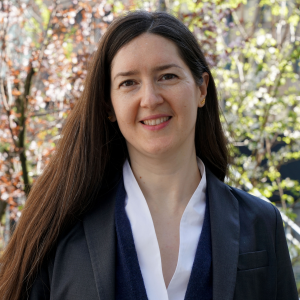
Anna Dimitrijevics, Deputy Head of Unit, Preparedness and Adaptation, DG CLIMA, European Commission
Anna Dimitrijevics is the deputy head of the unit in charge of preparedness and adaptation in the Commission’s department for climate action (DG CLIMA). Her team leads the preparation of the Climate Resilient Europe package – the EU’s climate adaptation plan – as well as the next European Climate Risk Assessment. Prior to this, Anna worked in the department for economic and financial affairs (DG ECFIN) and was a research fellow at Queens’ College, University of Cambridge.
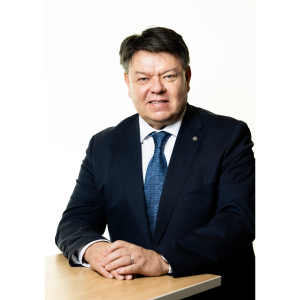
Petteri Taalas, Director-General, Finnish Meteorological Institute
Prof. Taalas is the Director General of the Finnish Meteorological Institute, FMI. He is specialised in climate change, disasters, water, change management/efficiency gains and UN affairs. He was born in 1961, and he has a PhD in Meteorology from the University of Helsinki. Prof. Taalas has an extensive professional career both in scientific as well as in leadership positions in the field of Atmospheric Science. Most recently prior returning to lead the FMI, he worked as the Secretary-General of the World Meteorological Organization (WMO) in Geneva for two 4-year terms of office. Taalas has acted as the Adviser in climate issues for the UN Secretary-General António Guterres. The Reader’s Digest nominated Prof. Taalas as the European of the Year in 2021 for the excellent work done for climate communication. For the same reason he has been rewarded by the Foundation of Louise ja Göran Ehrnrooth and Niemi Foundation.
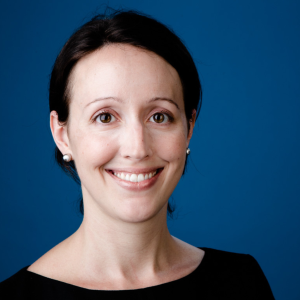
Monique Kuglitsch, Innovation Manager, Fraunhofer HHI
Dr. Monique Kuglitsch is the Innovation Manager at Fraunhofer HHI. Since 2020, M. Kuglitsch served as Chair of the ITU/WMO/UNEP Focus Group on AI for Natural Disaster Management, which recently transitioned into the ITU/WMO/UNEP/UNFCCC/UPU Global Initiative on Resilience to Natural Hazards through AI Solutions. She also serves as an Expert in the WMO’s Working Group on Digital Transformation for Hydrology and Water Resources and as an Expert in the Working Group on AI Capacity Building for the ITU/UNESCO Broadband Commission for Sustainable Development. In her past role at the American Meteorological Society, Dr. Kuglitsch was the Lead Technical Editor for several journals (including the Journal of Hydrometeorology and Journal of Physical Oceanography) and the Senior International Outreach/Communications Specialist. As a researcher, Dr. Kuglitsch has investigated past climate change, extreme weather events, and regional climate model projections. Dr. Kuglitsch has experience in fluvial and limnological field work, geochemical laboratory methods, applied mathematics and statistics, greenhouse gas emissions, and climate risk/impacts research. Her research has been published in high-ranking peer-reviewed scientific journals and books, cited in a past IPCC report and in Smithsonian Magazine, presented at academic conferences (most recently at EGU, Living Planet Symposium, and the AI for Good Summit), and featured in the press (with interviews in Time Magazine, DeutscheWelle, The Washington Post, the Tagespiegel, Women in Tech, and Forbes).

Cristian Canton, Associate Director, Barcelona Supercomputing Centre
Cristian Canton is the Associate Director of the Barcelona Supercomputing Center (BSC), where he helps lead one of Europe’s most prominent research institutions in supercomputing, artificial intelligence and quantum technologies. At BSC, he oversees strategic initiatives such as the deployment of MareNostrum 5, one of the world’s most powerful supercomputers, and the transformation of the centre into an AI-driven hub that promotes European scientific, industrial and social missions. His work emphasises technological sovereignty, international collaboration and the application of AI and HPC in areas such as climate science, health, chip design, social sciences and engineering in general.
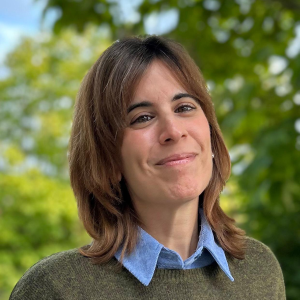
Eva Prieto, Climate Change Specialist, Predictia
Eva Prieto has a PhD in Physics, with experience in climate science and the analysis of large climate databases. She has coordinated the development of a web service for the provision of bias-adjusted, tailored climate projections, including the calculation of a large set of climate indices supporting National Climate Change Adaptation Plans. She currently manages the “Development and Implementation of Climate Emulator for Destination Earth (DestinE)”, an ECMWF contract developed by a consortium led by the company she works for, Spain’s Predictia Intelligent Data Solutions.
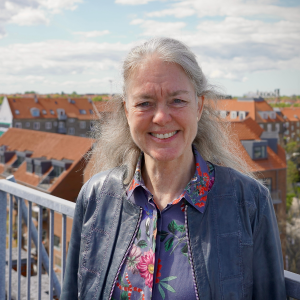
Marianne Thyrring, Director-General, Danish Meteorological Institute
Marianne Thyrring has held the position as Director General of the Danish Meteorological Institute (DMI) since 2013. Thyrring has many years of experience in government top-level management. Formerly, she was Permanent Secretary for the Ministry of Environment and Counsellor to the Minister for Economic Affairs and the Interior concerning democracy issues. Marianne has served as chair, vice-chair and co-chair in several international and European meteorological and environmental fora. Marianne holds a master’s degree in political science from Aarhus University.
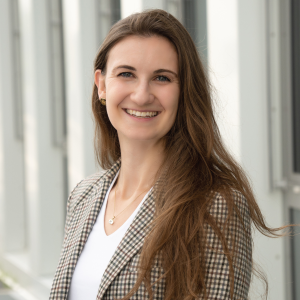
Sara Hahner Scientist for Machine Learning, ECMWF
Sara Hahner is a Machine Learning Scientist at ECMWF, where she works on representing different components of the Earth system in data-driven weather forecasting, focusing mostly on the ocean, sea ice, and waves. With a background in applied mathematics, she has explored machine learning applications across diverse fields, from modelling 3D shapes to analysing car crash simulations, and now focuses on how AI can enhance the accuracy and reliability of weather predictions.
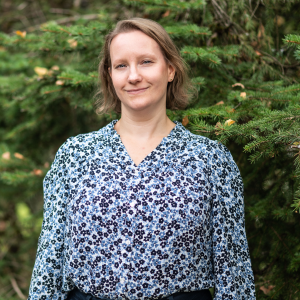
Lene Østvand, Researcher, MET Norway
Lene Østvand is a researcher at MET Norway. She is the project manager of two capacity building projects aiming to strengthen early warning systems in Malawi: the AI for EW4All Pilot Project and SAREPTA Malawi. She also works with forecast verification in both capacity building and other projects. Østvand holds a PhD in physics from UiT The Arctic University of Norway.
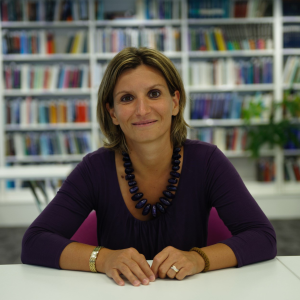
Irina Sandu, Director, Destination Earth, ECMWF
Irina Sandu is the Director of Destination Earth (DestinE) at ECMWF, having previously served as Science Lead for the initiative. In her role as Director for Destine, she leads on the implementation of activities that ECMWF is responsible for delivering within the initiative, including the implementation and delivery of the two earth system digital twins, digital twin engine and a wide range of AI activities, in partnership with over 100 institutions throughout Europe.
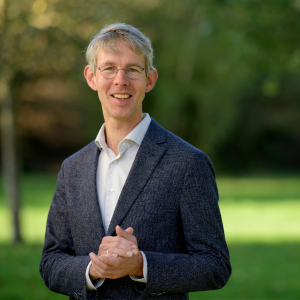
Maarten Van Aalst, Director-General, Royal Netherlands Meteorological Institute
Maarten van Aalst is Director General and Chief Scientist of the Royal Netherlands Meteorological Institute (KNMI) and Permanent Representative of the Netherlands at the WMO, ECMWF and EUMETSAT. He is professor of Climate and Disaster Resilience at the University of Twente’s Faculty of Geo-information Science and Earth Observation (ITC). Prof van Aalst is a member of the European Scientific Advisory Board on Climate Change and Review Editor at the Intergovernmental Panel on Climate Change (IPCC), where he previously served as Coordinating Lead Author (AR6, AR5, SREX). He is a Trustee at the International Institute for Environment and Development (IIED).

Erwan Marteil, Head of Unit, Prevention and Preparedness Capacity Building, DG ECHO, European Commission
At the European Commission, Erwan Marteil is the Head of Unit for DG ECHO B3 – Civil Protection Prevention and Preparedness Capacity Building. After studying in Paris (political sciences in Sciences Po, Development and Economic Law at the Sorbonne), he began his career in the European Commission in 1996. Following a period in Brussels with DG Environment, then DG Competition, he has spent 11 years of his career abroad – in Afghanistan, Turkey and in Geneva (migration and refugee counsellor). He worked further in DG DEVCO/INTPA on migration issues before joining ECHO on humanitarian affairs then civil protection.
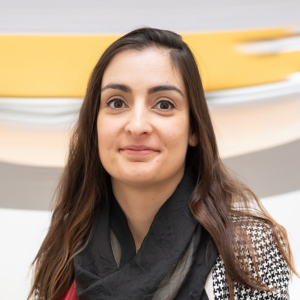
Ana Oliveira, Chief Technology Officer, +Atlantic
Ana Oliveira is CTO at +ATLANTIC CoLAB and an expert in Earth Observation (EO) applications, focusing on machine learning solutions for climate risk mapping and impact assessment. She holds a PhD from the MIT Portugal Programme, where she studied urban heat island effects in Mediterranean coastal cities using EO and climate data. She is the technical lead in several international projects, including ESA initiatives (CAREHeat, MiTHO, CLIM4cities, AIR4health, XHEAT), Copernicus Climate Change Service, Destination Earth (DestinE Urban Heat-Health Forecasting, and Evaluation and Quality Control Concept), and Horizon Europe projects (ObseSea4Clim, WindTwin, TerraDT).
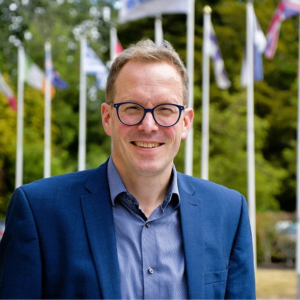
Florian Pappenberger, Director-General Elect and Director Forecasts and Services, ECMWF
Florian Pappenberger is the Director-General Elect and Director of Forecasts and Services for the European Centre for Medium-Range Weather Forecasts (ECMWF). He leads efforts to deliver reliable weather information and to harness technologies like AI and supercomputing to improve resilience to extreme events. Florian works with partners across Europe and beyond to turn cutting-edge science into practical solutions for society.
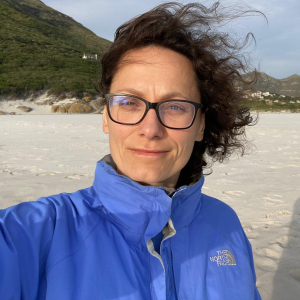
Grazyna Piesiewicz, Head of Unit, High Performance Computing and Applications, DG CNECT, European Commission
Grazyna Piesiewicz currently serves as the Head of Unit for High Performance Computing and Applications at DG CONNECT in the European Commission. In this role, she oversees the key EU HPC strategy, which includes the pan European deployment of interconnected supercomputing infrastructures as well as of AI Factories and Gigafactories in the EU as part of the EU AI Continent strategy. In addition, she leads the implementation of the groundbreaking Destination Earth initiative, aimed at creating a digital twin of the Earth system – a cutting edge climate simulation and prediction information system, with an important AI component. Previously she held various senior roles at the European Commission, including in data regulation and in competition law enforcement, with specific expertise in antitrust in the IT/electronics industry. She has also served as a member of Luxembourg’s Competition Council and as a référendaire at the General Court of the European Union.
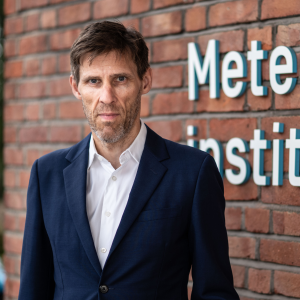
Jørn Kristiansen, Director, Development Centre for Weather Forecasting, Met Norway
Jørn Kristiansen, PhD, is Director of the Development Centre for Weather Forecasting at the Norwegian Meteorological Institute, leading over 60 professionals, including Norway’s widely used weather service, Yr. He co-leads the ECMWF Machine Learning Pilot Project (MLPP), a 15-partner initiative advancing machine learning in numerical weather prediction with a focus on data-driven and ensemble forecasting, ML-enhanced data assimilation, and supporting infrastructure. With extensive experience in operational NWP, Earth system modelling, and user-oriented weather services, Kristiansen is deeply engaged in European and international collaborations, including the Destination Earth initiative, ensuring that cutting-edge AI and modelling innovations translate into actionable forecasts.
Find out more about AI in Destination Earth.